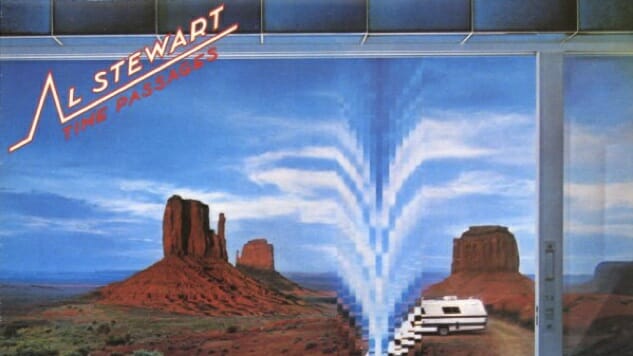How Al Stewart Became The Father of Elevator Rock

Groundbreaking songs have to be pioneering. But they don’t have to be good. One of the most innovative song of the 1970s took music down a perilous path by basically creating its version of the Genetically Modified Organism: Adult Contemporary.
“Time Passages” by Al Stewart was recorded nearly 40 years ago in 1978 and peaked in December of that year. Originally, it was characterized as “Easy Listening.” But by the time its run on the charts was over, “Adult Contemporary” was born. A more accurate name for the format was when it was called “Middle-Road” from 1962-1964. But the best name remains “Soft Rock,” which sounds appropriately embarrassing; no one’s putting that into a Tinder profile.
Adult Contemporary dominated radio in the 1980s and “Time Passages” became the transitional song, charting longer than any other in the format for a decade. It’s rock if you could somehow remove all the rock from it. Its signature is the “smooth jazz” saxophone of Phil Kenzie, who reportedly hit the highest note ever recorded in the sax solo. The sax solo is also a hallmark of AC. The electronic piano is present during a 1:30 jam in the middle of the song where a shoulder-dance groove breaks out so mom and dad can bop in the grocery aisle. Harmless guitar solo? Check. The lyrics became the template for meaningless drivel sung in a manner that sounds meaningful—as long as you don’t actually register the words:
Well I’m not the kind to live in the past
The years run too short and the days too fast
The things you lean on are the things that don’t last
Well it’s just now and then my line gets cast
Into these time passages
Yes, it rhymes. Past fast last cast. He and co-writer Peter White easily could have gone with gassed sassed mast. But the rhyme that works the best, of course, is half-assed.
Don’t just take my word for it. An expert on the song also hates it. Al Stewart, via an interview with acousticstorm.com:
“It was just one of those things where the record company asked me to write something that sounded like ‘Year Of The Cat’ and we ended up doing that. But I didn’t realize truly how bad a song it was until one day I was in an elevator and I was listening to what I thought was Muzak. About 30 seconds went by, and I finally began to recognize it and said to myself, ‘This sounds pretty horrible.’ Then, horror of horrors, I heard my voice come on, it actually was the record. So I’m thinking, ‘Oh my God what have I done, this is terrible!’”
Here he is at the Capitol Theatre in Passaic NJ in 1978:
What’s amazing about this performance is that it’s so polished you can barely tell it from the studio version. You can’t hear the crowd, which is either incredibly well-behaved or induced into a coma. Stewart doesn’t seem to hate the song here, either. But it’s hard to glean much emotion from him. There is a lot of head bobbing. It was a set closer, too, as Stewart announces a 20-minute break, pretty ballsy in New Jersey when your name is not Bruce Springsteen.
But, hey, maybe this all doesn’t strike you as so horrible. Perhaps you prefer your music as background sound and enjoy the barely perceptible distraction. Air Supply, Christopher Cross, Vangelis, post-Genesis Phil Collins and Peter Cetera (because Chicago rocked too hard I guess) have to eat too. The king of the format in the 1980s was Lionel Richie with “You Are” and “Hello” also reaching No. 1, period. Both have “smooth jazz” horns, though that could be the somehow more evil spawn of the the electronic piano—the synthesizer. Who can tell?